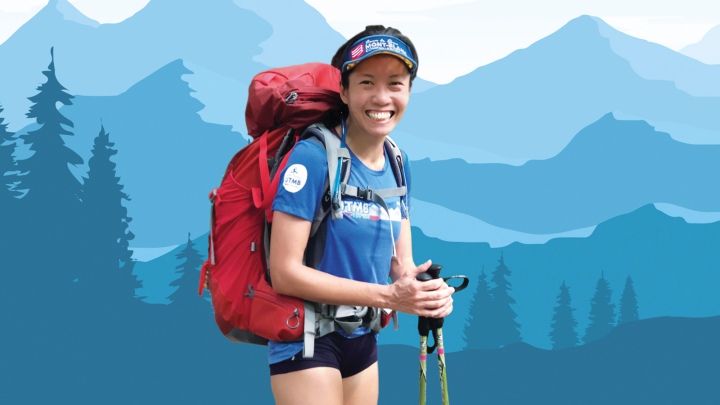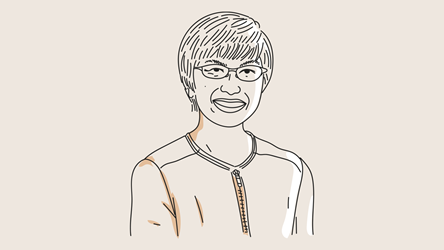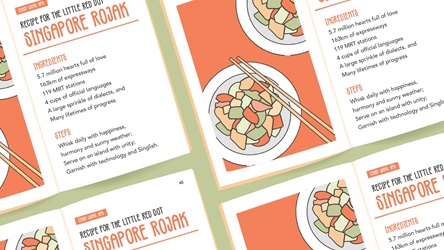Going The Distance: How To Stay The Course At Work

Endurance athlete Sim Phei Sunn has been running extreme distances of 100km and 100 miles, and also climbing for more than 10 years. In 2019, she is looking to scale the highest point in the world: Mt Everest. She shares how her work in Organisation Development (OD) helps her in her endurance sports, and vice versa.
My work involves helping public agencies be effective and healthy by improving their organisational culture and alignment, building stronger leadership and teams, and enhancing their capacity for managing change and engaging staff.
We focus on the people-side of things. This is my 21st year in the Public Service, and I’m still enjoying it.
In our work, a clearly articulated burning ambition does more to motivate and sustain change than a burning platform. Likewise in sports.
Fear is sometimes useful to kick one into action, but it is not sustainable. A big clear ambition or goal keeps me going longer and makes the pain more bearable.
Accomplished mountaineer Ed Viesturs wrote: “Getting to the top is optional. Getting down is mandatory.” It means to stay objective on what is important, and knowing when to ease off.
All of us can define our own “Everest”, be it a legacy or impact, a position to reach or a trying period to overcome. Along the way, let us be mindful not to leave a trail of destruction or burnt bridges behind.
I do three types of training: cardio, strength, and specific training such as staircase runs. I go with what my body tells me, so I will push more when I feel up to it, and ease off when the work week was particularly draining.
Phei Sunn's training
- Cardio comprises 7-10km runs about twice on weekdays, and 25-30km trail runs on weekends. It is about spending enough hours on my feet to build up my endurance.
- For strength, I have a gym that runs 30-minute HIIT (high-impact interval training) sessions that I go to three times a week, often during lunch times. So on some days, I might have a double session of gym and running.
- When I have an upcoming expedition or technical race that involves a lot of elevation gain (i.e., climbs), I will add in specific training. For example, I will alternate a weekday run with stair climbing. There is a conducive 40-storey HDB flat behind my office that I go to.
- Similarly, on weekends, I will replace one of the long runs, load up my backpack with more than 20kg, put on ankle weights, and head out to Bukit Timah Hill for a few hours of climbs.
Staying grounded and present is important for safety during training and races/expeditions. When I am mentally distracted, it is easy to trip and fall, or make a misjudgement in the trails or mountains.
Ultra-running taught me to focus on my own pace and not be distracted by others. It also trained me to be attuned to my physiological and emotional states. During a race or climb, I am always mindful of the states that I am in.
Self-awareness and staying centred are core skills required for the OD work I do. We hold the space for our client agencies and colleagues to have tough discussions and tackle difficult work. If we waver, the participants will waver.
I’ve led a number of corporate climbs to Mt Kinabalu and Mt Rinjani for various public agencies. While I provide the reassurance and encouragement for colleagues to challenge themselves, I am mindful of when it is my responsibility to push and when it is on them to put in the effort, and who should own the outcome. Similarly in my line of work.
I have learnt to reframe defeatist thoughts of “I’m not good enough” to “I’m not ready yet” from the many times I failed to reach a summit or finish a race.
A self-limiting belief public officers may have is: “I am too small to make a difference, my views do not matter.” We hear such sentiments often in the public sector transformation work that we support. The notion of an elite group of public officers and bosses who know it all is outdated but deeply ingrained.
Many still hold back from offering ideas or stepping forward to own issues. It could be the perceived futility of voicing out.

It is useful to ask ourselves what our intent is. For the things we want to say or do, are they in service of the organisation and larger system, or in service of ourselves? Is it something that the system needs to hear, and hear now? Our underlying personal values will shape our responses to those questions and guide our actions.
Introspection is an underrated skill. For a start, take the time and effort to always be curious about oneself, and explore the whys about ourselves. Stay courageous through it. Sometimes we may not like the answers we discover, but probe deeper anyway.
Mapping one’s emotional high-points and low-points over time is another helpful way to recall and reflect on key events over a period. We often use this mapping process when we work with teams and individuals.
Minimally, it helps to know what energises us, and what might drain us but still needs to be done. Then we can be more intentional about how to approach the potentially draining ones and not be depleted by them.
A huge, complex work project can look daunting at the start, and it is the same when tackling a big race or climb. Chunking the journey and being flexible are good techniques to apply both at work and on the trail.
Focusing and counting down to the next checkpoint or campsite makes the challenge more manageable. At the same time, keep an open mind to adjust the strategies to what is happening on the ground.
Learning and pushing boundaries is important to me. I deliberately pick one or two “stretch” race events each year where I have a high chance of not finishing. It keeps me humble and grounded.
I remind myself constantly not to be too caught up with performance pressures, and I intentionally carve out space for experimentation and seeking out new experiences.
Wondering whether I will do well or not when considering what to try is a warning that I am sliding down the performance slippery slope. I do not want to get good grades from picking safe and easy subjects.
Likewise at work, I frequently put myself into new challenging areas because those are where the learning and growth opportunities are.
I once had a portfolio that was very much out of my comfort zones, but it was also a most fulfilling year. Don't try, won’t know.
Read more about Phei Sunn's adventures and setbacks in climbing.
- POSTED ON
Mar 11, 2019
- TEXT BY
Siti Maziah Masramli
- PHOTOS BY
Adventure III









